Thudar Parba in Tulunadu, popularly known as Deepawali, is one of the important festivals in the region. All festivals here are unique considering the culture and tradition handed down from elders.
This is a three-day festival involving the worship of Baliyendra and cows being a significant part of it.
Naraka Chaturdashi
The first day of Thudar Parba is Naraka Chaturdashi. This day is celebrated to mark the death of asura Narakasura at the hands of Lord Krishna.
Everybody wakes up early morning and takes a hot water bath after applying oil on the whole body. A major fun event here for children is while filling water into the mande (a large copper vessel, which holds the hot bathing water for everybody). The well and bathroom are beautifully decorated with drawings, flowers, and leaves after giving them a thorough clean up. This water filling process is done on the previous night of the morning bath.
This process of waking up early morning (before sunrise), applying oil to the whole body and massaging till it is absorbed in the skin, and then taking a hot water bath has numerous health benefits. Apart from acting as a good moisturizer for the skin, this process also cleanses the skin of environmental pollutants, toxins, and removing dead cells as well. It is also said to increase the circulation of blood. Massaging the head with warm oil relieves stress and calms the mind, which is said to stimulate the nerves and aid in sensory-motor integration.
After the bath, people wear new clothes, light deepas, burst firecrackers and enjoy sweets with their loved ones. Sweetened beaten rice (Bajil in Tulu or Poha in Hindi) is one of the mandatory dishes enjoyed this morning.
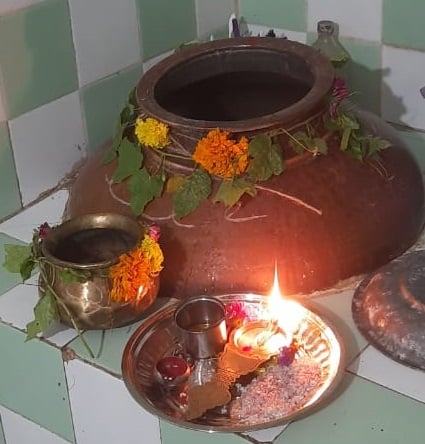
Bajil Padunu
During the year, if there has been any death in the family, “Bajil Padunu” is a program to remember them and pay respects. Early morning (before sunrise), the ritual involves serving Bajil sweetened with jaggery and mixed well with coconut shavings, sesame seeds & ghee. Along with the sweet Bajil, dosa and banana are also served. The agel (offering) is completed with a deepa and all family members gather to offer a prayer in memory of the departed soul.
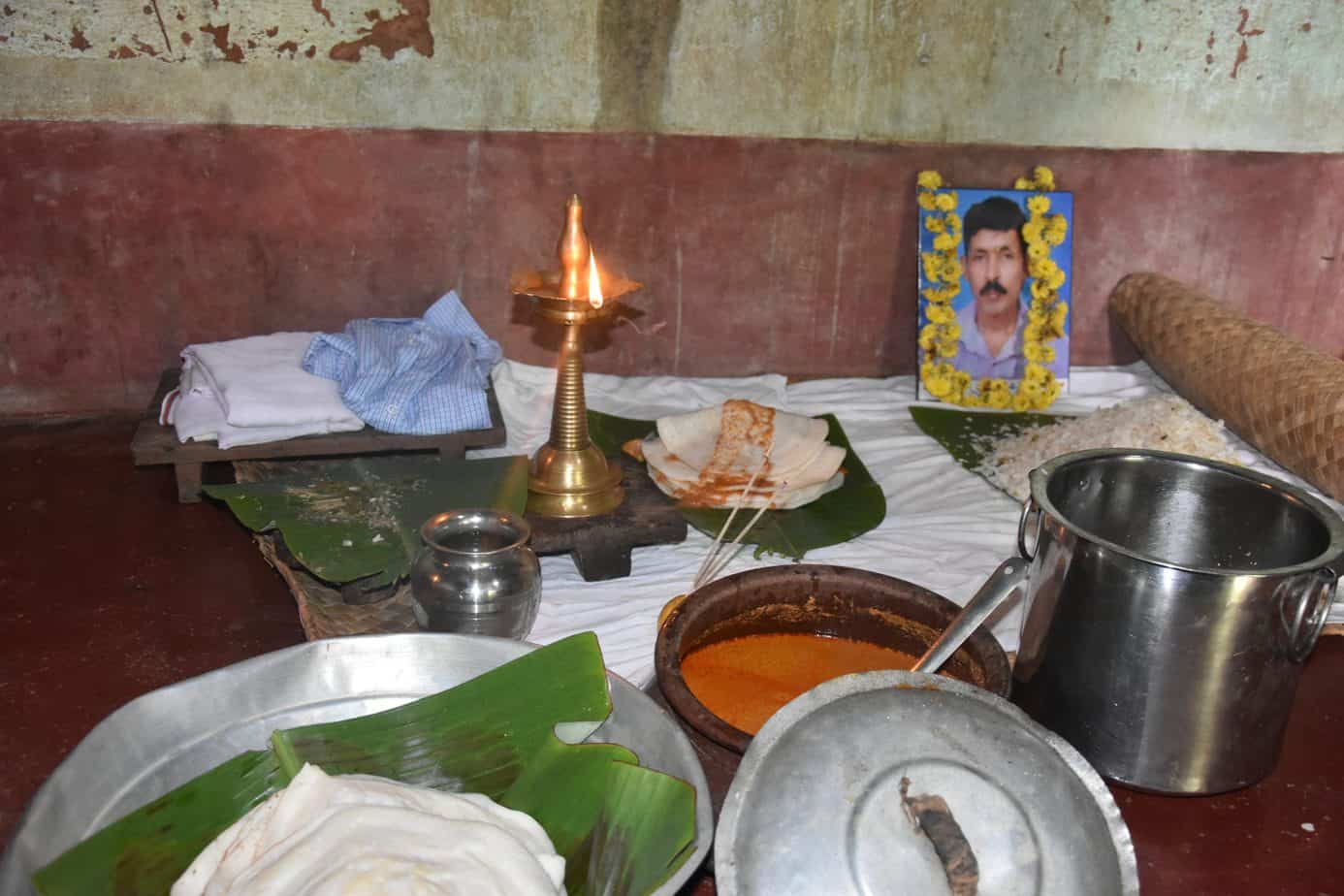
Lakshmi pooja during Thudar Parba
The second day of Thudar Parba is on Amavasya and Laxmi Pooja is done. It is believed that this day marks the celebration of Goddess Laxmi’s wedding with Lord Vishnu. It is also considered important because of the belief that Goddess Lakshmi visits each house to bless her devotees with great wealth and good fortune. Business related to wealth like jewelers and bankers do their pooja in a grand way.
Baliyendra Pooja
This is the third day of Thudar Parba and called Balipadyami. Bali Chakravarthy, one of the greatest Vishnu Bhaktas is welcomed as part of the Thudar Parba celebrations. Traditional torches are lit up for Deepavali for Bali Chakravarthi. A stand was traditionally made with Paleda mara, but these days it is also made with Jackfruit tree. This stand is decorated with flowers and lamps. On one banana leaf, tender coconut is placed. On another banana leaf, a serving of sweetened bajil, banana & dosa is placed.
All family members gather in front of this setup in the late evening along with a small quantity of bajil in their hands. The elder family member makes a prayer seeking blessings from Bali Chakravarthy. All family members come forward and offer the bajil.
A farmer takes this ritual further by taking all his agricultural tools like plough, sickle etc to the field and decorates them with flowers, leaves. He makes an ardent prayer to Baliyendra to come down to earth and bless the land by saying Koo, Koo, Koo thrice.
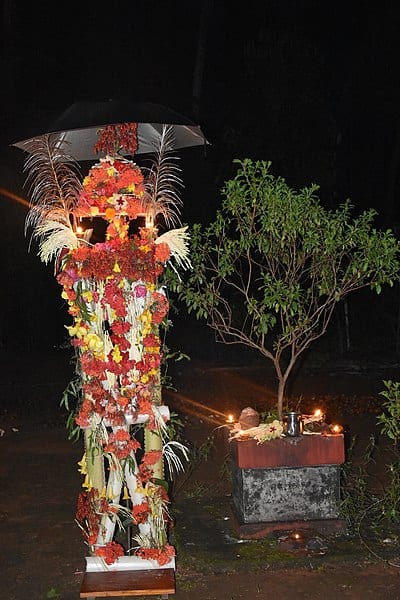
Go (cow) Pooja
All the cows and calves in the house have to be given a bath on the morning of Deepawali. After Bali pooja is done at night, all the cows in the kidhe (cowshed), are decorated with a garland of flowers and kumkum on the forehead. Their legs are also washed in preparation for the Go (cow) pooja.
In one thadpe (large plate made of straw with thick edges and available in every Tulunadu home), place a small quantity of rice, bajil, baar (rice grains with their cover on) along with a deepa. Show this to all the cows and do pooja. Serve each cow with neer dosa and banana on a banana leaf after doing pooja.
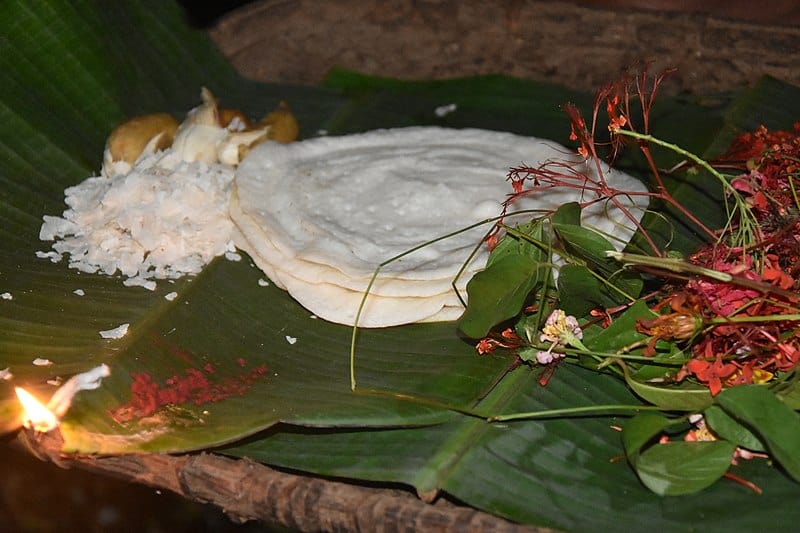
The last day of Thudar Parba in Tulunadu region is marked by Dhanyalakshmi poojas. Most grocery shop keepers, food outlets, and other business establishments conduct pooja on this day (popularly called “Angadi Pooja”). This pooja is preceded by hard work of cleaning up the entire store in every corner. Regular customers, friends, and relatives are invited to the place of business and treated with sweet packets and juice.
See this video related to Baliyendra ritual by a farmer at his fields
Video Source: Whatsapp Forward

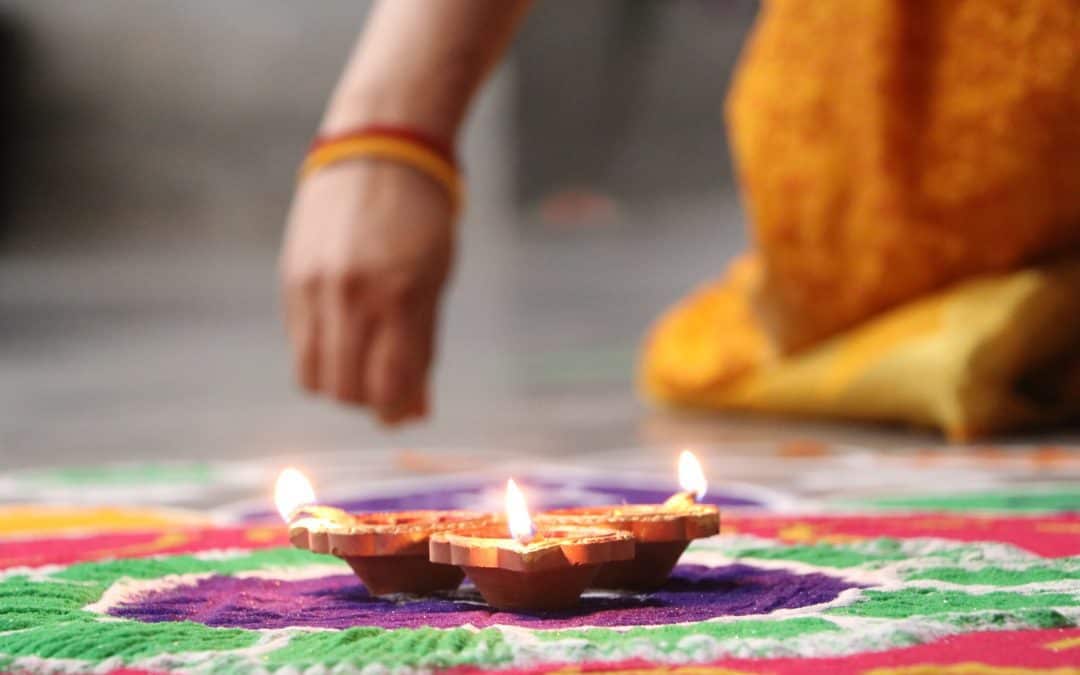
Recent Comments